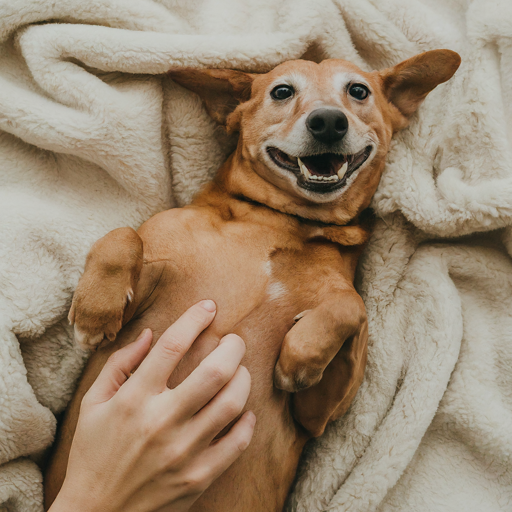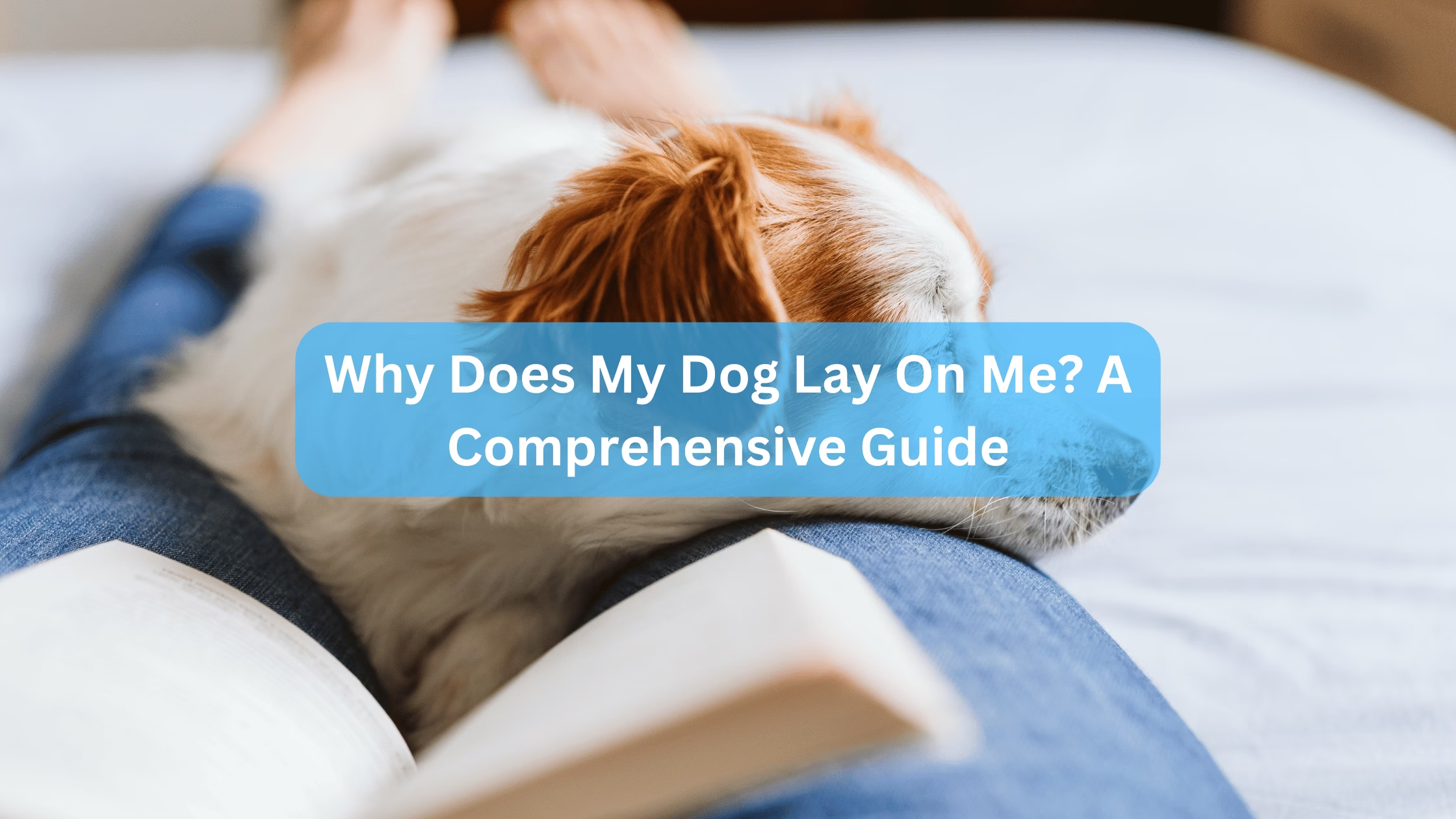As a devoted dog owner, you may often find your furry friend snuggling up to you, laying on your lap, or even taking over your bed.
This behavior can be both endearing and puzzling, prompting the question, “Why does my dog lay on me?”
In this article, we will explore the various reasons behind this behavior, addressing common scenarios such as laying on you at night, in the morning, or when you’re feeling emotional.
The Emotional Connection

Dogs are inherently social creatures that thrive on companionship. When your dog lays on you, it is often a reflection of their need for closeness, comfort, and security.
This behavior is not merely about physical proximity; it signifies a deep emotional bond between you and your canine companion.
9 Reasons Why Does My Dog Lay On Me
1. Affection and Love
At the heart of this behavior is affection. Dogs crave closeness and emotional connection. When your dog lays on you, it is their way of expressing love and trust.
This physical closeness fosters a sense of security and comfort for both you and your pet.
The act of laying on you is not just about seeking physical comfort; it’s a profound expression of their love and trust in you.
The gentle strokes and pets they receive while being close are reassuring and comforting for them, creating a mutually beneficial interaction.
2. Channeling Pack Mentality
The concept of pack mentality plays a crucial role in understanding why dogs like to lay on their human parents.
Dogs are descendants of wolves, animals known for their strong pack hierarchies.
In a pack, physical closeness is not just about warmth or comfort; it’s a means of reinforcing social bonds and hierarchy.
When your dog chooses to lay on you, they are echoing this ancestral behavior. It’s their way of acknowledging your ‘family’ unit and your role within it.
By laying on you, your dog reinforces your social bond, showing their acceptance and trust in you as a pack member and leader.
3. Hyper-Attachment
Hyper-attachment is a behavior seen in some dogs who become overly dependent or attached to their owners.
This can be particularly noticeable in breeds known for their loyalty and protective nature.
If your dog seems anxious or unsettled when you’re not around and prefers to stay physically close when you are, it might indicate hyper-attachment.
While it’s flattering to be the focus of such devotion, it’s important to ensure that this attachment doesn’t evolve into separation anxiety or other behavioral issues.
4. Seeking Attention
Sometimes, the reason is as simple as seeking attention. Dogs are intelligent creatures and quickly learn which behaviors get them what they want.
If laying on you has historically resulted in extra pets, cuddles, or playful interaction, your dog will likely repeat this behavior to get your attention.
It’s their way of saying, “Hey, I’m here, and I’d love some love and attention right now.”
For dogs with high energy and a strong desire for interaction, laying on you can be an effective method to ensure they’re not ignored.
5. Separation Anxiety
While some dogs may not express separation anxiety by laying on you, this behavior can be a sign of separation anxiety in others.
This condition manifests as stress and fear when a dog is separated from their owner.
For dogs experiencing this, laying on their owner can be a way of coping with their anxiety and finding comfort in physical closeness.
This behavior is often accompanied by other signs of distress, such as pacing, whining, or destructive behavior when left alone.
Understanding and addressing separation anxiety is crucial for your dog’s overall well-being.
6. Resource Guarding and Jealousy
Resource guarding is a behavior where a dog protects their resources, which could be food, toys, or even people.
If your dog lays on you and shows signs of aggression or discomfort when others approach, they might be resource-guarding you.
This behavior can also be linked to jealousy. It’s important to address resource guarding and jealousy through proper training and socialization, as these behaviors can lead to problematic aggression if left unchecked.
7. They’re Trying to Communicate
Some dogs lay on their owners as a form of communication. This behavior can be their way of expressing a need or desire.
If your dog lays on you and whines or cries, they might be trying to tell you something.
It could be a sign of discomfort, a request for attention, or an indication of an underlying health issue.
Paying attention to these cues is crucial for understanding your dog’s needs and ensuring their well-being.
Learning to interpret these signals can strengthen the bond between you and your dog.
8. Warmth and Comfort
The desire for warmth and comfort is a basic instinct in dogs. Just like us, they seek cozy, warm places to relax.
Laying on you provides them with a comfortable and warm spot, especially during colder months.
Dogs, being naturally heat-seeking creatures, are drawn to the warmth of their owner’s body, making it a perfect resting place.
9. You’re Sick, and They Know It
Dogs have an incredible ability to detect changes in their owner’s physical and emotional state.
They can pick up on subtle cues, such as changes in scent, behavior, and even body language, which might indicate that you’re not feeling well.
This behavior is a sign of their empathy and their innate desire to provide comfort and companionship during times of distress.
It’s one of the many ways dogs show their deep connection and attunement to their human companions.
Frequently Asked Questions (FAQs)
Why does my dog lie on top of me?
Your dog lying on top of you is often a sign of affection and trust. This behavior can also indicate a desire for comfort, warmth, or attention. By laying on you, your dog reinforces the bond between you and feels secure in your presence. It’s a way for them to connect emotionally and physically, ensuring they are close to their beloved human.
Why does my dog lie between my legs?
When your dog lies between your legs, it’s a way for them to seek a safe and secure spot. This position allows them to feel protected and close to you, reinforcing the bond and trust between you. It’s a comforting gesture that signifies their need for closeness and security, often seen in dogs that are particularly affectionate or anxious.
How do dogs know when you are sick?
Dogs possess an acute sense of smell and can detect changes in your body chemistry that may signal illness. They are also highly observant and notice changes in your behavior and routine, which alerts them to the fact that something is different. This sensitivity allows them to respond empathetically, often seeking to provide comfort and companionship when they sense you are unwell.
Do dogs think of their owners as dogs?
Dogs do not necessarily think of their owners as other dogs. However, they recognize their owners as part of their social group or ‘pack’ and form strong emotional bonds with them. This bond is built on trust, affection, and mutual understanding, allowing dogs to see their owners as integral members of their family unit.
Why does my dog lay on me in bed?
Your dog may lay on you in bed for comfort, warmth, and security. This behavior reinforces their bond with you and allows them to feel close while sleeping. Dogs often seek out their owners during rest periods, as it provides them with a sense of safety and companionship throughout the night.
Why does my dog lay on me every morning?
This behavior could be a routine your dog has developed to start the day feeling close and connected to you. It may also signal that it’s time to wake up and begin the day together. Dogs thrive on routine, and this morning ritual can be a comforting way for them to greet the day.
Why is my dog laying on me all of a sudden?
A sudden change in behavior like this could be due to various reasons, such as seeking comfort during stress, feeling unwell, or changes in their environment that make them seek more reassurance from you. It’s essential to pay attention to these changes, as they may indicate that your dog needs extra support or comfort.
Why does my dog lay on me and lick me?
Laying on you and licking can be signs of affection. Licking is a soothing behavior that signifies respect and trust in the dog-human relationship. This behavior often indicates that your dog feels comfortable and secure with you, and they may be trying to communicate their love and bond.
Why does my dog lay his head on me?
When your dog lays his head on you, it’s a sign of trust, affection, and a desire for closeness. This comforting gesture shows that they feel safe and content with you, reinforcing the emotional connection between you and your pet.
Why does my dog lay on my chest and stare at me?
Laying on your chest and staring at you can be a deep expression of love and trust. It’s also a way for them to bond and communicate, seeking your attention and engagement. This behavior indicates that your dog is comfortable and wants to strengthen the connection with you.
Also Read: How Many Ribs Do Dogs Have? A Comprehensive Rib Guide
Also Read: High Cholesterol in Dogs: A Comprehensive Guide
Conclusion
Understanding why your dog lays on you can enhance the bond you share and enrich your relationship.
This behavior often reflects affection, instinct, and communication, highlighting your dog’s emotional needs.
Embrace these moments of closeness, as they signify trust and love from your canine companion.
By recognizing and responding to these behaviors, you can create a nurturing environment that meets both your needs and those of your beloved pet.
Sources:
- https://www.boredpanda.com/pet-wellness/dog/why-does-my-dog-lay-on-me/
- https://www.reddit.com/r/Dogtraining/comments/13m29gt/why_does_my_dog_lay_on_me/
- https://wagwalking.com/behavior/why-dogs-like-laying-on-you
- https://wildearth.com/blogs/dog-knowledge/why-does-my-dog-lay-on-me
- https://casper.com/blog/dog-sleeping-positions/







